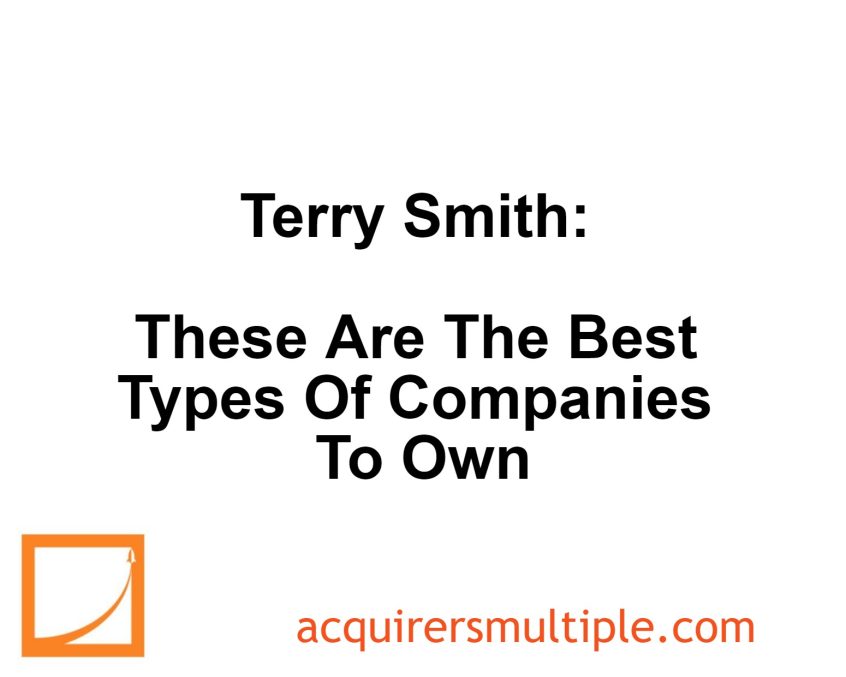During his recent interview with The Financial Planner Life Podcast, Terry Smith discusses his investment strategy, which focuses on three key areas: consumer products, medical devices, and technology.
He highlights the importance of everyday consumer goods, medical devices, and broad technology sectors, companies like Apple, Visa, and Microsoft. Smith explains that while these are all “technology companies,” they operate in vastly different markets with unique drivers.
Additionally, he invests in industrial companies that generate revenue from services, upgrades, and maintenance, such as elevator and compressor manufacturers. Smith emphasizes the long-term value of service-based revenue streams over one-time sales in industries like automotive and industrial equipment.
Here’s an excerpt from the interview:
Smith: We always invest in the same areas. I mean if you look at our portfolio, you’ll find the three big things that we invest in over time and have done, and we’ll probably continue to do, are consumer items—your everyday necessities and luxuries.
You know, when you have a drink, when you eat something, when you go to the bathroom, when you clean the kitchen, when you feed the pets, etc. So anything in the consumer area is of interest to us basically.
Medical technology is of interest to us—people who make things that go into bodies—tubes, catheters, artificial knees, robotic surgery equipment, drugs, in one case, in terms of the weight-loss drug manufacturer, Novo Nordisk.
And technology. But when I say technology, you’ve got to be careful because people think technology just means one thing. It’s a broad church technology. So we own Automatic Data Processing (ADP)—sounds like a technology company, doesn’t it? And it is. It does payroll processing, right.
We own Amadeus, which uses technology to do airline reservations. We own Meta, the old Facebook, which does communications and online advertising. We own Alphabet, the old Google, which does search and online advertising. We own Microsoft, which does operating systems and distributed computing, okay? And we own Apple, which does mobile devices.
They’re all technology companies, but they’ve all got quite different drivers, haven’t they? The markets they operate in are very, very different. So, you know, we own a couple of other companies out there as well.
I mean, we own Visa. Visa is a technology company. I know people say it’s a credit card company. Do you know how much money Visa has lent in its entire history to people?
Not one single cent—that’s what the banks do. Visa operates the payment system, right. It’s a technology business. So technology—people use it as if they’re all the same. No, they’re very, very different.
And then we have a tail of things outside of consumer in the industrial area—typically companies that have an installed base of equipment that they sell to people, which gives them a tame market to sell services, spares, upgrades, and things to, elevator and escalator companies.
You put an elevator in here from, who’s this elevator? Fujitec? This one, Fuji. You know, there’s a 75% chance that you’ve signed a maintenance contract—the building signed it on your behalf by the way.
They’re spending your money. It’s even better, to maintain it. By the way, it’s a legal requirement to maintain it. It’s not just, “I’ll do it when it goes wrong.” No, you have to have a nice certificate on it, which says it’s being maintained. That’s where the money is made, right.
And there are lots of examples of people who supply things like testing equipment, elevators, compressors, generators—where once they’ve supplied the equipment, the money is really made from selling you spare parts, service, upgrades, software, etc., like your car.
Your car isn’t the… making the car doesn’t make any money, right. It’s everything that comes after it.
You can watch the entire interview here:
For all the latest news and podcasts, join our free newsletter here.
Don’t forget to check out our FREE Large Cap 1000 – Stock Screener, here at The Acquirer’s Multiple:



